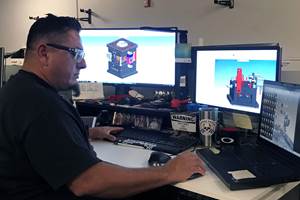Letters: Generating Mold Designs Efficiently
Moldmakers express their opinions on industry issues
As a follow-up to the article Sacrificing Quality for Cost, submitted by Dennis Swanson in the October 2001 issue of MoldMaking Technology magazine, I agree entirely with the point that 'cheaper is not always cheaper.' The article makes reference to using overseas tool builds that are of marginal quality in an effort to cut costs. However, I also see the same issues of poor engineering and poor quality proactively carried out from various mold shops and molders within the U.S. While there is no mystery that a properly designed and manufactured mold will produce the best parts while yielding the most proficient cycle times, there are many tool builds that begin with 'I don't have a lot of money for this' or 'we need to keep costs down.'
I fail to understand how building a mold with foreseeable maintenance problems and insufficient cooling can be cost efficient in the long run. Purchasing agents can direct a shortsighted approach that may ultimately make it less profitable to produce parts. The decision to place an order with the lowest bid should be scrutinized relative to the total calculated costs including mold down time, reject rate and repair. Principal fundamentals of the decision making process used to award suppliers with an order should include experience, track record and accountability. In most cases it will usually cost more up front, but will have a larger impact contributing to the overall profit.
Several times so far this year I have reviewed mold designs where the molds were designed and manufactured in the U.S., but were not reliable or able to run acceptable cycle times. I was asked to quote redesign or offer suggestions for improvement of processing conditions. In one case, a mold producing a large, relatively complex part was built without cooling lines in the cavity inserts. How can up-front cost cutting be justified when the end result may be that the mold could be worthless? As the old saying goes, 'there is not any value to things that do not work.' Cycle time, fallout rate and maintenance should be key issues prior to mold build, but these items are not always considered when the bottom line costs are evaluated. These items create success or failure during processing and will dictate final profit.
The procedures of generating mold designs efficiently are constantly changing and consistently being refined. As a mold designer, I am continually faced with the same challenges of reducing design costs and mold build costs through design. Therefore, the design should be specific to manufacturing techniques and engineered for optimum mold processing.
I believe that better planning, procedures and service will achieve the productivity needed to keep U.S. molders and mold builders successful. Arbitrary up-front cost cutting is for vendors content to have their moldmakers stare at a design wondering how to build it or a molder hoping that his tooling holds up just before it fails. As a mold designer I'm not sure how inferior tooling can be a bargain, but as a consumer I'm sure that I'm paying the price.
Robert Lippert
President, Northern Design, Inc.
Related Content
Top 10 Topics to Cover During an ISO 9001 Manufacturing Audit
Take a look at this practical hands-on approach to conducting a quality audit.
Read MoreHow to Improve Your Current Efficiency Rate
An alternative approach to taking on more EDM-intensive work when technology and personnel investment is not an option.
Read MoreMaking Mentoring Work | MMT Chat Part 2
Three of the TK Mold and Engineering team in Romeo, Michigan join me for Part 2 of this MMT Chat on mentorship by sharing how the AMBA’s Meet a Mentor Program works, lessons learned (and applied) and the way your shop can join this effort.
Read MoreMold Design Review: The Complete Checklist
Gerardo (Jerry) Miranda III, former global tooling manager for Oakley sunglasses, reshares his complete mold design checklist, an essential part of the product time and cost-to-market process.
Read MoreRead Next
Are You a Moldmaker Considering 3D Printing? Consider the 3D Printing Workshop at NPE2024
Presentations will cover 3D printing for mold tooling, material innovation, product development, bridge production and full-scale, high-volume additive manufacturing.
Read MoreHow to Use Strategic Planning Tools, Data to Manage the Human Side of Business
Q&A with Marion Wells, MMT EAB member and founder of Human Asset Management.
Read MoreReasons to Use Fiber Lasers for Mold Cleaning
Fiber lasers offer a simplicity, speed, control and portability, minimizing mold cleaning risks.
Read More




















